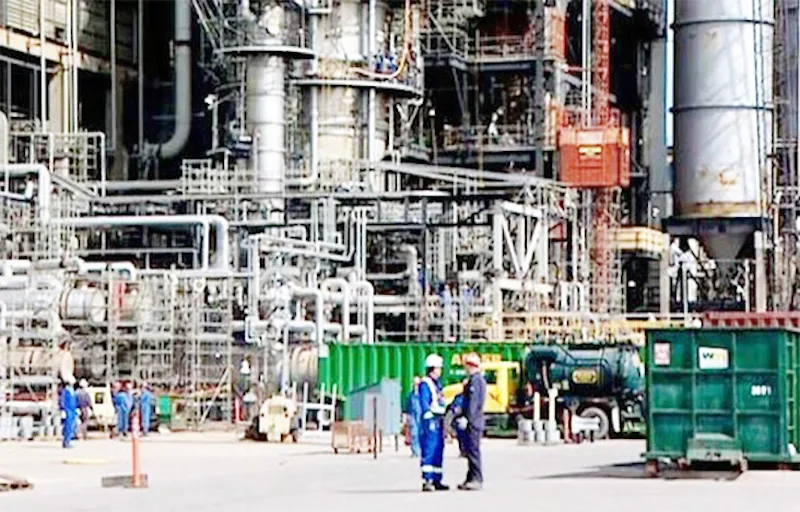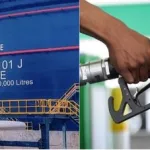Dangote Refinery commences distribution of 25 million litres of refined petrol to retail outlets
The long-anticipated operation of Dangote Refinery begins this Sunday, with the refinery delivering 25 million litres of refined petrol to retail outlets across Nigeria.
This move promises to boost Nigeria’s fuel supply and reduce reliance on imported petroleum products, a significant step forward for the country’s energy sector.
Join our WhatsApp ChannelDaily Distribution via NNPC Trading Limited
The Nigerian National Petroleum Corporation (NNPC) Trading Limited will handle the distribution of Dangote Refinery’s petrol, which will be sold to marketers at ₦765.99 per litre.
According to a source familiar with the arrangement, this price includes transportation costs.
“NNPC Trading Limited will continue to import an additional 15 million litres to meet Nigeria’s total daily demand for petrol, which ranges between 40 and 50 million litres,” the source said.
Each marketer will receive a maximum of 50 trucks per day. These trucks will distribute the petrol at the current pump prices of ₦855 to ₦897 per litre, depending on the location. This pricing structure indicates that the introduction of Dangote Refinery’s petrol into the market will not affect current fuel prices, despite the increase in local production.
Smooth Transition and Operational Plans
To facilitate a seamless distribution process, marketers have been instructed to send their trucks to the refinery ahead of the lifting process.
“Marketers are already preparing for the lifting of fuel from Dangote Refinery, and we expect smooth operations from Sunday onward,” the source added.
The refinery’s management has also announced plans to increase its daily petrol output. “By next month, Dangote Refinery will scale up production to 30 million litres per day, and marketers will begin collecting petrol directly by vessels,” a representative from Dangote Refinery confirmed.
This scaling up of production is expected to provide a more stable fuel supply, helping Nigeria meet its growing energy demands and reducing the need for expensive fuel imports.
A Joint Announcement from NNPC and Dangote Refinery
Both NNPC and Dangote Refinery are expected to make a joint statement soon regarding their collaboration in distributing refined petrol across the country. According to sources, representatives from both entities have been in meetings in Abuja to finalise details about the distribution process.
READ ALSO: Fuel Price: Why Dangote Refinery Won’t Fix Nigeria’s Fuel Crisis
“The joint effort between Dangote Refinery and NNPC will play a key role in stabilising Nigeria’s fuel supply and improving availability for consumers across the country,” the source mentioned.
Dangote Refinery’s Impact on Nigeria’s Economy
Dangote Refinery, located in the Lekki Free Trade Zone, Lagos, is a significant industrial development for Nigeria. As the largest single-train refinery in the world, its full-scale operations are expected to reduce the country’s dependence on imported fuel, strengthen local production capacity, and support Nigeria’s economic growth.
“This is a major milestone for Nigeria. We are looking forward to seeing how this will positively impact the economy,” the source added.
By producing refined petroleum products locally, Dangote Refinery is expected to save Nigeria billions of dollars that would otherwise be spent on fuel imports. The refinery’s operations will also create jobs and attract investments into the country’s energy sector.
Global and Regional Market Influence
The launch of Dangote Refinery is expected to shift fuel market dynamics in Nigeria and beyond. With Nigeria being a major consumer of imported fuel, Dangote’s production could reduce the country’s dependency on European refineries, which currently supply a significant portion of Nigeria’s petrol needs.
Andon Pavlov, an analyst at Kpler, a global trade intelligence platform, commented on the potential global impact of Dangote Refinery’s operations. “As much as 300,000 to 400,000 barrels per day of refining capacity in Europe could be at risk due to increased global production of gasoline, including from Dangote Refinery,” Pavlov said.
In recent years, European refineries have enjoyed a profitable market in Nigeria, driven by the country’s need to import refined products due to its insufficient local refining capacity. However, with the Refinery entering the scene, Nigeria’s demand for imported fuel is expected to decline, which may challenge the market share of European refineries.
Shipping data suggests that Nigeria’s new refinery is already ramping up gasoil exports to West Africa, capturing market share previously held by European suppliers.
Future Prospects for Nigeria’s Energy Sector
With the full operation of Dangote Refinery, Nigeria’s fuel supply chain is set to undergo a major transformation. Experts predict that the refinery’s contributions will significantly alleviate the fuel shortages that have plagued the country for years.
As Dangote Refinery continues to increase its production capacity, Nigeria may soon become a net exporter of refined petroleum products. This development will not only enhance the country’s energy security but also provide a boost to the national economy.
“We expect Dangote Refinery to become a key player in both regional and global fuel markets,” a source from NNPC noted. “This refinery will change the way fuel is produced and distributed in Nigeria and beyond.”
The commencement of Dangote Refinery’s petrol distribution marks a new era for Nigeria’s energy industry. With its capacity to produce 25 million litres of petrol daily, the refinery is poised to reduce Nigeria’s dependency on imported fuel and stabilise the country’s fuel supply.
The collaboration between the refinery and NNPC promises to benefit not only the fuel market but also the broader Nigerian economy.
Emmanuel Ochayi is a journalist. He is a graduate of the University of Lagos, School of first choice and the nations pride. Emmanuel is keen on exploring writing angles in different areas, including Business, climate change, politics, Education, and others.
- Emmanuel Ochayihttps://www.primebusiness.africa/author/ochayi/
- Emmanuel Ochayihttps://www.primebusiness.africa/author/ochayi/
- Emmanuel Ochayihttps://www.primebusiness.africa/author/ochayi/
- Emmanuel Ochayihttps://www.primebusiness.africa/author/ochayi/




















Follow Us